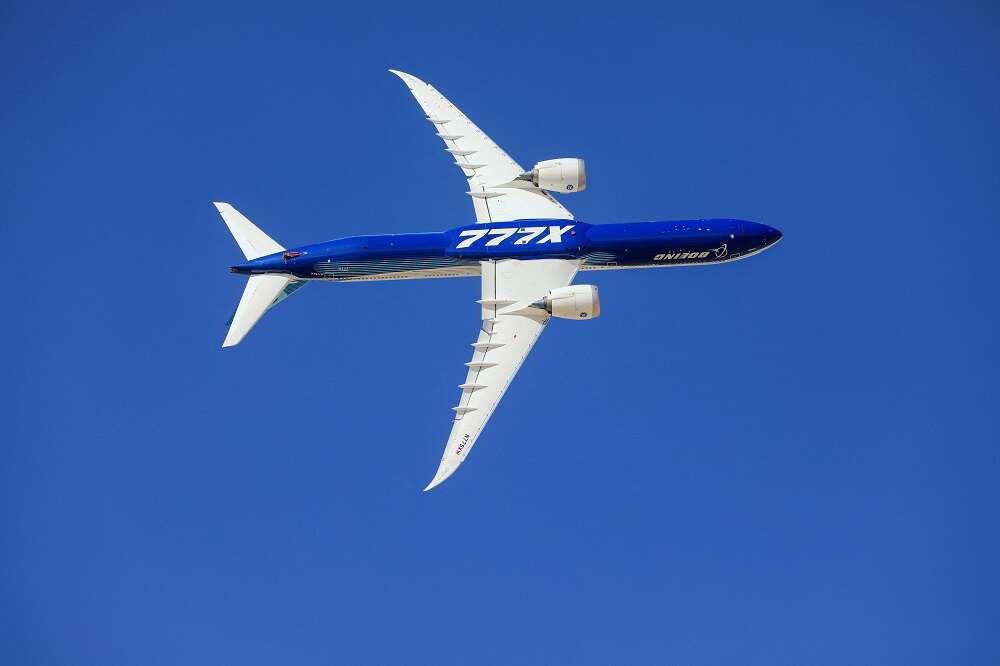
By Eric M. Johnson and Abhijith Ganapavaram
(Reuters) -Boeing Co said on Wednesday it was halting 777X production through 2023 due to a fresh delay in its entry into service after certification problems and weak demand, with $1.5 billion in added costs for the mini-jumbo program.
Shares of the U.S. planemaker fell 11% to $146.62 in early trading – a nearly 1-1/2 year low – after it posted a quarterly loss and disclosed more than $1.2 billion in charges linked to supplier costs and technical problems on its Air Force One presidential plane, trainer jet, and the war in Ukraine.
“Another dreadful set of results,” Agency Partners analyst Nick Cunningham said in a client note, adding that a “general sense of disarray continues” and flagging that net debt rose to a new peak of over $45 billion.
On the plus side, Boeing said it submitted a certification plan to U.S. air-safety regulators in a step toward resuming deliveries of its 787 Dreamliner, halted for nearly a year by inspections and repairs in an industrial headache costing about $5.5 billion.
The twin-aisled Dreamliner, along with the 737 MAX, are vital to the financial health of Boeing, which is trying to bounce back from successive crises.
It has been producing the Dreamliner jets at a low rate while it undertakes inspections and repairs for structural flaws amid intense regulatory scrutiny.
Boeing has “completed the required work on initial airplanes and is conducting check flights”, Chief Executive Dave Calhoun told employees in a memo on Wednesday, a development that should cheer airlines that have cut back on flying long routes due to delivery delays.
Boeing did not specify when Boeing would resume Dreamliner deliveries. Reuters reported last week it had advised key airlines and parts suppliers that the deliveries would resume in the second half of this year.
Boeing also confirmed reports of a delay in handing over the first 777X jet to 2025, from the previous target of late 2023, but said it remained confident in the program.
“We’ve got to give ourselves the time and freedom to get this right,” Calhoun told analysts on a call after the company posted results.
Calhoun said the halt in 777-9 production was based on a longer safety certification timeline, a risk reported by Reuters in February.
He said the production pause would help minimize inventory and the number of jets requiring retrofits, while it adds to freighter capacity with a newly launched cargo spinoff of the 777X, the world’s largest twin-engine passenger plane.
“We are concerned that this delay (in 777X delivery) may allow airlines to cancel without penalty,” Citi Research analyst Charles Armitage said.
Reuters reported last month that the Federal Aviation Administration had warned Boeing that existing certification schedules for the 737 MAX 10 and 777X were “outdated and no longer reflect the program activities.”
Boeing reiterated it expects its 737 MAX production rate to reach 31 planes per month in the second quarter, a slight delay from what some analysts expected, though industry sources have not ruled out a slip.
Calhoun reiterated Boeing was on track to return to positive cash flow in 2022 as it ramps up deliveries of the 737 MAX cash-cow narrow-body aircraft, with travel rebounding from the pandemic.
“Traffic is returning, and it’s returning in a pretty big way,” Calhoun said.
It reported a quarterly core loss per share of $2.75, compared with a loss of $1.53 per share a year ago. Revenue fell to $13.99 billion from $15.22 billion.
Like other aerospace companies, Boeing is grappling with supply chain shortages, inflation and fallout from the coronavirus pandemic and war in Ukraine.
“Inflation continues to take a hard run at everything we do,” Calhoun told analysts.
It booked a $660 million charge in the quarter on its VC-25B – commonly known as Air Force One – due to higher supplier costs and technical problems and schedule delays.
It recorded $367 million in charges for its T-7A Red Hawk trainer jet due to inflation, supply chain issues and impacts related to the pandemic.
It booked pre-tax charges of $212 million due to impacts of the war in Ukraine and international sanctions against Russia, which pose risks to materials supply and aircraft orders.
(Reporting by Eric M. Johnson in Seattle and Abhijith Ganapavaram in Bengaluru; Additional reporting by Nishit Jogi from Bengaluru; Editing by Arun Koyyur, Bernadette Baum and Nick Zieminski)


